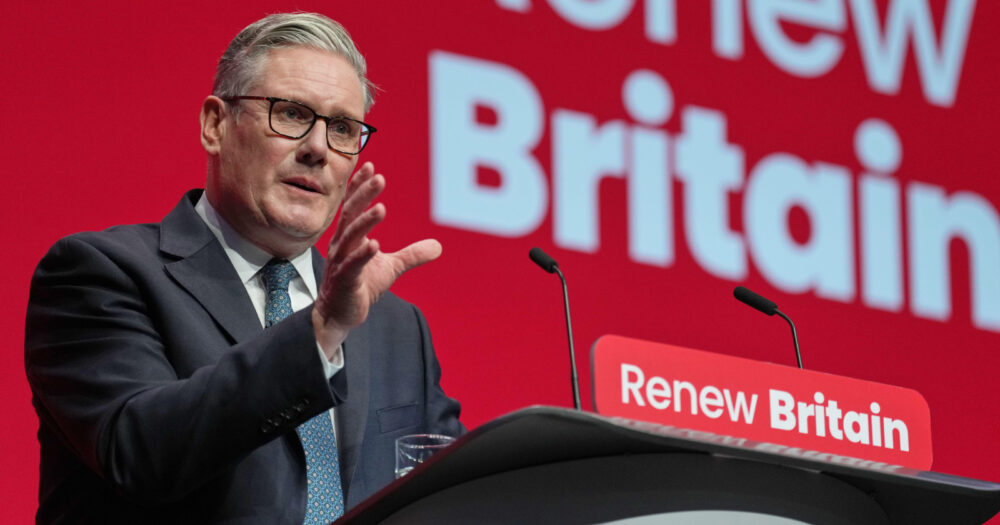Sir Keir Starmer has “scrapped” Labour’s target of getting 50 per cent of young adults into higher education and set a new goal that includes FE and apprenticeships.
The government will also pump “nearly £800 million” extra into 16 to 19 education next year from the existing spending review settlement, including the creation of 14 new technical excellence colleges.
Officials have also revealed colleges will be held to account by new “regional improvement teams” and gain new awarding powers, with details expected to be fleshed out in the post-16 white paper due this autumn.
‘I don’t think that’s right for our times’
Prime minister Sir Keir Starmer told his party conference today he will make it a “defining mission of this Labour government” to no longer ignore further education.
He said the target of getting half of young adults into higher education, symbolically set by Tony Blair in 1999, was not “right for our time”.
Instead, the country should be aiming for two-thirds of young people to get higher-level skills, either through university, further education, or a “gold standard” apprenticeship by age 25.
Starmer said: “While you will never hear me denigrate the aspiration to go to university, I don’t think the way we currently measure success in education – that ambition to get 50 per cent of kids to uni – I don’t think that’s right for our times.
“Because if you are a kid or a parent of a kid who chooses an apprenticeship, what does it say to you? Do we genuinely, as a country, afford them the same respect?
“Today I can announce, we will scrap that target and we will replace it with a new ambition that two-thirds of our children should go either to university or take on a gold standard apprenticeship.”
Downing Street said this target will include “at least 10 per cent of young people pursuing higher technical education or apprenticeships that the economy needs by 2040, a near doubling of today’s figure”.
‘Young people backed. The glass ceiling smashed’
The prime minister also singled out the value of further education, stating it has long been seen as the “Cinderella” sector, before giving a nod to yesterday’s youth guarantee announcement from chancellor Rachel Reeves.
He told conference: “I can also announce, that further education, so long the Cinderella service, ignored because politicians kids don’t do it, we will make it a defining mission of this Labour government, with higher standards in every college, the quality of teaching raised, more apprenticeships, more technical colleges, technical excellence colleges, qualifications linked to jobs rooted in their communities.
“And as Rachel announced yesterday, a new guarantee of training, work support or an apprenticeship for every young person struggling to find work.
“That’s young people backed. The glass ceiling smashed. The grafters finally included in our country’s highest aspiration. That’s a Britain built for all.”
White paper reforms
There will be 14 new technical excellence colleges, focused on “high-growth sectors such as advanced manufacturing, clean energy, and digital”, Downing Street announced after the prime minister’s speech.
This builds on the 10 technical excellence colleges already announced for construction and five for defence.
A spokesperson said that to support these reforms, the government will also invest “nearly £800 million extra into funding for 16- to- 19-year-olds next year (2026-27).
“Coming from the existing spending review settlement, this funding will support an additional 20,000 students and make our FE system world-class.”
Officials have also given an insight into what will come in the post-16 white paper for FE and HE, including new awarding powers for colleges.
“The reforms pave the way for a joined-up post-18 education system, with a unified regulator and funding model for level 4+ courses,” a government spokesperson said.
“FE colleges will gain new awarding powers, and the Lifelong Learning Entitlement will ensure parity in student finance across higher level study FE and HE – opening up opportunities for more learners, including through modular courses tailored to priority skills.”
The government said it will hold the sector to account through the new Ofsted framework, as well as new “regional improvement teams” in FE to “support college improvement”.
Regional improvement for standards and excellence (RISE) teams already exist for schools under direction from the Department for Education.
The advisers are educational experts and identify areas for improvement, typically in situations where a school receives a poor Ofsted report.
Also on the cards in the post-16 white paper is new “structured professional development from initial teacher training through to leadership” for FE teachers.















Your thoughts